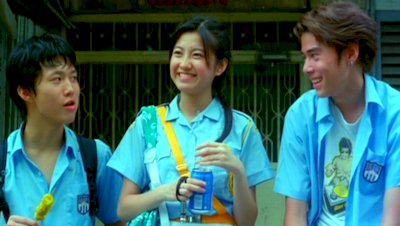|
|
|
|
|
|
|
|
|
|
|
Gimme
Gimme |
|
|
|

Siu Yu-Wa, Yoyo Chan and Tsui Tin-Yau give and get |
|
|
Year: |
2001 |
|
|
|
Director: |
Lawrence
Lau Kwok-Cheung |
|
|
|
Producer: |
Johnnie
To Kei-Fung |
|
|
|
Cast: |
Yoyo
Chen,
Tsui Tin-Yau, Siu
Yu-Wa, Yuen Cheuk-Wai, Law Wai-Ying |
|
|
The
Skinny: |
Natural
acting and buoyant energy fuel this successful Hong Kong experiment
in youthful realism. Lawrence Lau and Johnnie To should be
lauded for their attempts to create real film rather than
the usual pop-star fueled commercial vehicles. |
|
|
Review
by Kozo: |
Lawrence Lau's last film was the harrowing youth drama Spacked
Out, which used unknown actors and realistic situations
in the service of social commentary. The same could be said
for his latest, Gimme Gimme, but the social commentary
isn't as hot-button or bombastic as Spacked Out's.
Gimme Gimme features a cast of young high school-age
unknowns who struggle with the pain and discovery of love.
Their concerns are more mundane than those of the girls in
Spacked Out, but the feelings these kids experience
are no less real.
Gimme Gimme follows a
group of friends who are due to graduate from school within
a year or so. More importantly, they hang out, jam with their
makeshift rock band, skateboard with the other local kids,
and fall in and out of love. Track star Skid (Siu Yu-Wa) meets
the girl of his dreams Pat (Yoyo Chan), but lacks the guts
to make his move. Thankfully, his friend Fion (Law Wai-Ying)
manages to befriend Pat, and brings her along to their group
outings. However, Pat takes a shine to Lobo (Tsui Tin-Yau)
and vice-versa. Despite this, Lobo encourages his buddy Skid
to make his move on her.
This standard romantic triangle
setup is just the beginning, however. In addition to the romantic
pinings of those three, we have the player attitude of Soda
(Yuen Cheuk-Wai), who views love as a game and keeps numerous
girlfriends at his beck and call. Orange-haired Fion switches
boyfriends constantly, and turns to anonymous phone chatting
to find her ideal love. Other friends come and go with their
recognizably painful experiences with love, but the film always
returns to these central characters to make its ultimate conclusion
on teenage romantic angst.
However, said conclusion actually
never occurs, which is where the film transcends its numerous
clichéd plot devices. The existential underpinnings
to these romantic explorations are old hat for Hong Kong flicks,
but Lawrence Lau doesn't over-analyze or dress up the situations.
Everything is shown in a realistic, impartial manner that's
infused with buoyant youthful energy. Personal issues get
discussed here or there, but any platitudes speak from a character's
personality and not some higher narrative or thematic goal.
More often than not, we experience the emotional difficulties
of these kids as they happen, which is more rare in cinema
than you would think.
Adding to the realism are the non-judgemental
depictions of the main characters. The kids aren't perfect,
nor do they necessarily pay for their moral transgressions.
Soda's player attitudes are inherently awful, but his ultimate
lesson is personal rather than universal. The friends aren't
above embarassing or exploiting outsiders for their personal
amusement, nor are they insensitive to the sudden pain and
heartbreak of others. Even upper-class good girl Pat (who
is essentially the film's objectified dream girl) has her
share of self-centered issues.
Director Lau wrings real, natural
performances from his cast of unknowns. The anger, pain and
joy that they feel seem to naturally spring from their personalities
and situations. Adding to this is the distinct lack of adult
figures, which only appear on the edges of their lives. Of
all the kids, Lobo has the biggest parental issue. His dad
is in jail and his mom is gone, which fuels some of his self-doubt.
Otherwise, the world we experience in Gimme Gimme is
the world that these kids inhabit. The adults are static figures
outside their immediate world - what matters are the friends
and lovers they're in the process of gaining or losing.
Ultimately the film's numerous
plotlines must reach a conclusion. However, despite the cheesy
events (the kids are going to perform their first concert!)
and necessary romantic conclusions (Pat has to choose one
of her suitors), the world of Gimme Gimme never feels
less than real. Love and pain fade, friendships strengthen
or fail, and youth find their own resiliency. The film's bouncy,
energetic feeling lasts long after the credits roll.
If Gimme Gimme can be faulted
for anything, it's that its subject matter could be classified
as minor and inconsequential. The experiences of the kids
in Gimme Gimme are common and unspectacular in theme
and consequence. None of the characters experience any personal
trauma of the Spacked Out variety, nor do they act
out the lurid coming-of-age melodrama of a S.E. Hinton novel.
The only thing special about this movie is that the kids and
the situations are distinctly Hong Kong and inherently real.
And quite frankly, that's more than enough to make Gimme
Gimme a good, even excellent, little film. (Kozo 2002) |
|
|
Availability: |
DVD
(Hong Kong)
Region 0 NTSC
Chinastar Entertainment Group
16x9 Anamorphic Widescreen
Cantonese and Mandarin Language Tracks
Removable English and Chinese Subtitles |
|
|
|
 |
|
|
|
image courtesy
of Chinastar Entertainment Group
|
|
| back
to top |
|
|
|
|
|
|
|
|
| LoveHKFilm.com
Copyright ©2002-2017 Ross Chen
|
|
|